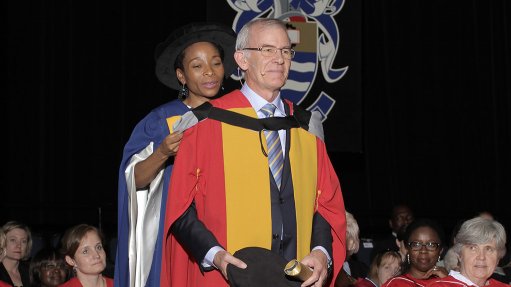
BRIAN BRINK Primarily owing to the efforts of Brink, two of the country’s largest companies initiated programmes that saved many thousands of lives
The University of the Witwatersrand (Wits) awarded an honorary doctorate to diversified miner Anglo American chief medical officer Dr Brian Brink last month for his role in the provision of antiretroviral therapy (ART) to miners.
Brink was the group medical consultant at Anglo American where, together with former nonexecutive director Bobby Godsell, he played a “strategic role” in introducing free ART to the company’s employees.
“Brink believed passionately in the value of ART in treating HIV and the moral necessity for providing it to the workforce.”
The citation adds that he spent many years fighting executive hesitancy and uncertainty within the company.
Anglo American’s public expression of commitment to an ART programme in August 2002 was a major victory for his persistence, courage and unwavering commitment.
At the time Anglo American employed about 68 000 people in South Africa, two-thirds of those on its platinum mines. The company’s leadership pressed Brink for precise numbers on what an ART programme would cost the company.
He consistently argued that there were too many unknown variables to make precise calculations.
Brink also argued that providing ART would ultimately cost less than not doing so.
He believed that it was critical for business to take the lead – although government was resisting – and was strongly criticised by the then Health Minister, Dr Mantombazana ‘Manto’ Tshabalala-Msimang, for his stance.
The citation highlights that, despite the frustrations Brink felt, he kept up his internal lobbying activities until the August 2002 commitment.
“Brink was the champion. He motivated and turned around a sceptical group. Without his efforts, it would not have happened,” said one of Brink’s former colleagues.
In 2002, Anglo American estimated that about 23% of its employees in Southern Africa were living with HIV, and that in any one year 10% to 15% of them might need ART.
The group contracted with AngloGold’s Aurum Institute for Health Research to manage the implementation of ART through company-owned and -operated healthcare facilities.
By the end of 2002, 11 company sites had been registered for the delivery of ART by Aurum and about 100 employees were receiving treatment.
“Primarily owing to the efforts of Brink, two of the country’s largest companies, Anglo American and AngloGold, initiated programmes that saved many thousands of lives, brought credit on the companies, and most importantly, set an example for the state health service to follow once the resistance of government leadership to ART had been overcome,” asserts the citation.
Moreover, the citation notes that Brink advises the Nelson Mandela Foundation on the strategic response to HIV/Aids in South Africa, and also serves as an alternate board member for the private sector delegation on the board of nonprofit organisation the Global Fund to Fight Aids, Tuberculosis and Malaria.
Further, it points out that he is involved in various national initiatives to enhance the role of the private sector in broadening access to sustainable, quality healthcare for all the citizens of South Africa.
Brink is a director of Discovery Health, the largest health insurer in South Africa, a board member of Section27 (formerly the Aids Law Project), and the current chair of the International Women’s Health Coalition, which provides technical advice on the most appropriate interventions in support of the health of women and girls in developing countries.
“Brink is a Wits graduate, [who] deserves his alma mater’s recognition for his far-sighted and courageous persistence in leading the way in a matter of great humane and political importance. Wits is proud to honour its graduate for his leadership in this vital field of social change by awarding him with an honorary doctorate,” the citation concludes.